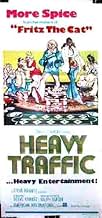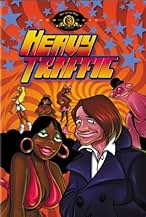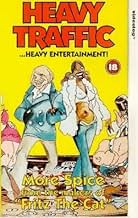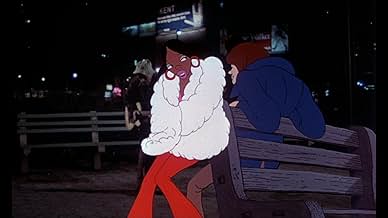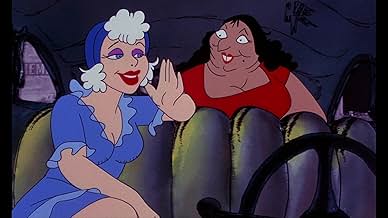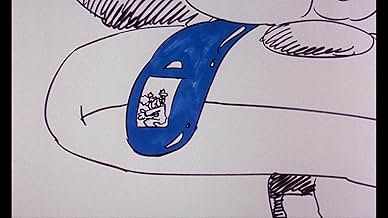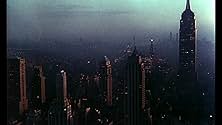Füge eine Handlung in deiner Sprache hinzuAn underground cartoonist contends with life in the inner city, where various unsavory characters serve as inspiration for his art.An underground cartoonist contends with life in the inner city, where various unsavory characters serve as inspiration for his art.An underground cartoonist contends with life in the inner city, where various unsavory characters serve as inspiration for his art.
- Angelo "Angie" Corleone
- (Synchronisation)
- Ida Corleone
- (Synchronisation)
- Molly
- (Synchronisation)
- Rosalyn Schecter
- (Synchronisation)
- Rosa
- (Synchronisation)
- Crazy Moe
- (Synchronisation)
Empfohlene Bewertungen
This is rumored to be animation-pioneer Ralph Bakshi's favorite among all his projects. And no wonder. This is his story! A 22-year old Jewish-Itallian spends his time playing pin-ball non-stop and drawing. He still lives with his parents, an Itallian man who cheats on his wife and a Jewish woman who's so emotionally torqued up--such a drama queen, that when Angelo comes home after a night with his lady, she hits him over the head with a frying pan and sticks his head in the oven.
There's always domestic unrest in any family, particularly with interracial married couples who lived in the Bronx around this time. But they're so wound-up, so ready to snap--they come to blows and sharp instruments a little too quickly.
Way too quickly, in fact. Angelo and Ida's Punch-and-Judy relationship--coupled with the problems that reside outdoors in the Bronx--Michael seems doomed to have some of it rub off on him. "You hang around garbage long enough, you start to stink," as they say.
But Michael has an outlet for his angst and confusion. Rather than fall into the trap many around him seem to, he vents himself at the drawing board. He draws a lot of the people and places in the Bronx. Although he seems to dislike many of them, they're so broad and colorful and wired, they translate easily to caricatures.
Bakshi takes us to all the usual haunts we visit in his movies--trashy ghetto neighborhoods with buildings that look condemned, dirt-cheap apartments, behind the wheel of cars, rooftops, nightclubs, bars, brothels.
The lives of all of the Bronx inhabitants: Jews, Itallians, blacks, drag queens, junkies, vagrants, hookers, cops, thugs and the like. And by using animation, Bakshi (and Michael) sort of illustrate their world and their eccentricity, which is so dangerous, it borderlines on insanity.
I wasn't particularly crazy about the disco remix of "Scarlbrough Fair." What can I say? I fell in love with the original.
But I suppose it does fit in with the nature of the film. Bakshi uses a lot of shots of Michael playing pinball. He's a big pinball fanatic. It's obviously a metaphor, perhaps for the hectic universe in which Michael bounces from one scenario to another, for which he's constantly out of place.
Carol is a black woman who works at a local bar where Michael draws on the roof. She's loud, she's opinionated, she's passionate. And she really seems to be about something. She's not just an ethnic joke.
Like all bars, there are lots of colorful locals there, plenty of dangerous ones to be sure.
Michael tries to score free drinks with his art. But that's all he tries to score Michael's no ladies' man and he knows it. He's a deep, sensitive, skilled artiste. And a sitting duck for some of the louder, tougher guys who make up the city.
It doesn't help matter that he's a virgin and everyone knows it. At one point, some greasers try to hook him up with a loose woman who's eager to have it with a guy who's so fresh and green. Although this leads to a disaster. Even his own father tries to hook him up. Now there's a true loving father for you.
Michael has an eye for Carol (many people at the bar she tends do), not because he's dying to get laid like nearly every other male. But he seems to genuinely feel something real for her. When she offers it up to him in gratitude for a favor, he faints. He wants her, but he's just not ready.
Ida is fussy and over-protective of her son, just like a mother hen. Or rather a Jewish mother. Angelo wants his son to be more of a "man's man." Like all of Bakshi's films, this contains a lot of graphic violence and sexual images, as well as caricatures in the ethnic vein.
But surprisingly, in the strangest way, it contains real heart, as well as some sweetness. The relationship between Michael and Carol has to be seen. Bakshi could've made her just an archetype like everyone else and he didn't. She's just as developed and human and relative as dear Michael is. These two deserve one another.
"Heavy Traffic" is wildly imaginative and thrilling in all it's glory. Like "Being John Malkovich," we actually feel like we're inside the author's head rather than his film. This truly ranks as Bakshi's best. He deserves more credit for this than "Fritz The Cat." How much of all this take place in Michael's mind and how much of it takes place in his reality? Maybe they're one and the same. Maybe not. Maybe we're supposed to figure it out. It up to us. Just like Michael's life is up to him.
The characters in the city are so damn cartoonish and erratic already, they transfer them into cartoon characters without losing anything in the translation.
Bakshi doesn't paint a pretty picture of the city and it's locals. But then again, he never has, has he? That's one of the things he's known for.
But that's not the only thing. Let's hope that when he goes... he'll be remembered for a lot of things.
Especially this one. It is... not only his best, not only one of the year's best... but of the best.
--For Ralph Bakshi, for film, forever, Dane Youssef
Heavy Traffic outlays Bakshi's outlook on life in a skill that could be called animated exploitation film-making. However, it's through this overloading of characters *meant* to be unattractive, sexually piggish, wretchedly racist (and, on the other side of the coin, sexist), and violent in the tradition of the Looney Tunes cartoons with the worst taste, that the film gets to the guts of the matter. It's a half-embrace, half-attack on a lack of values in a society, and as Baskhi relishes in his excess, he also is criticizing both himself for lapping it up and those in the neighborhood for being such eccentric mother-f***ers. And, as a satire should be, it's very funny, occasionally uproariously so. Scenes like Michael being pressured to get it on with the girl on the mattress on the roof, and the outcome as a sort of running gag; the scene with the song Mabeline playing, as Baskhi puts out drawings that are without much color, and look incredible for the reason that there's seemingly little effort put into the animation with the random over-the-top sexual positions; the little bits in the feuding with Michael's parents, the mother with her Jewish-star knife-holster and the father with his dedication to the "Godfather", who eats little people in his pasta, over anything really with his family; and when Michael presents "religious" cartoons to a dying old man, which to any prurient Christian taste is hilariously offensive and, well, cool.
Bakshi is so personal at times, with his taste in color schemes, in over-lapping images with film clips, combining live-action and animation (usually with dancing ladies on one side and a lurid little twerp gawking on the other), and even likely real family photos from his own family laid in, that it levels going too far. There's a tendency for self-indulgence, however not always the bad kind, if that makes sense, and one can see how the film can and has been vehemently criticized for what it is really trying to criticize in the film. But deep down, past the creative madman in Bakshi, is also a heart; his film ends on a touching note, as abstraction turns real and a totally live scene reveals another level to Michael and Carol, as real outcasts who are both totally stubborn, and somehow meant for each other. Heavy Traffic is a one-of-a-kind affair, and the kind of under-the-radar act of an outrageous spectacle that it could only be done in the 70s. Grade: A-
First, the animation: I know a lot of people find it charming, but it stinks. Yes, there are a few good sequences and some clever parts, but 95% is just crude and terrible. It's something that would have been much better if put into live action. Why animate something when it would be easy to show it live?
Second, the story. Where the hell is it? An "underground animator" (how cliche) hates his life and then goes out to become a pimp? Are you kidding me? There is no semblance of plot or logic. I know it's a "fantasy world" and all but that doesn't forgive Bakshi of not having any kind of plot whatsoever. A pathetic excuse for a script.
Thirdly, the stereotypes. Gays, blacks, Jews, Italians, the handicapped, everyone is fair game. And while I wasn't offended by these creations per se, I just found them lazy and uninteresting. Is there anything that separates Bakshi's Jewish mother from any other stereotype of a Jewish mother that you've ever seen?
I found this film a complete waste of time.
Wusstest du schon
- WissenswertesHalf way into production as Bakshi was fired (before being re-hired). A different director stepped in and animated a train sequence in which Michael goes to visit his brother-in-law. He is on a subway and witness' a woman sleeping while two men begin to undress her. Michael just watches. As the woman wakes up, she screams "rape" toward Michael. This was in the original script, but was scrapped when Bakshi returned to the project, as he felt the scene was in bad-taste.
- Zitate
Moe: Hey, It's Michael Corleone! What's you doin' now?
[makes pigeon noises]
Moe: What's you doin' now?
Michael: Hey, crazy man! How come you're not down in your basement?
Moe: Well, I, I came to kill your pigeon, boy.
Michael: Ah, that's bullshit, Moe, you're probably peekin' down at the ladies.
Moe: Yeah! My peekin' days long shut down, Michael.
[sadly]
Moe: I ain't there no more. I just ain't there.
[plays his harmonica]
Michael: Ah, you're just a crazy nigger, Moe. Just a goddamn crazy nigger.
Moe: We's all niggers, boy! Ha ha! You an' me, just goddamn crazy niggers! We's all niggers boy. Most of us don't know it yet.
Michael: [passing a joint to Moe] Hey, listen, you want some of this shit?
Moe: Even your pigeon's a nigger! Ha ha ha ha ha! That's why I'm gonna kill him.
Michael: Moe, you ain't gonna do shit!
Moe: Moe: I just ain't there. Every - everybody plays like they there... but they ain't there. I ain't there. Your pigeon ain't there! He flies high like he there, but he don't fly 'less you open that cage. And he got to come back 'cause he's trained to! He ain't there.
- Alternative VersionenIn 1974, the film was cut and rereleased with an "R" rating, replacing the previous "X" rated version.
- VerbindungenEdited from Die 42. Straße (1933)
Top-Auswahl
- How long is Heavy Traffic?Powered by Alexa
Details
- Erscheinungsdatum
- Herkunftsland
- Offizieller Standort
- Sprachen
- Auch bekannt als
- Heavy Traffic
- Drehorte
- Produktionsfirmen
- Weitere beteiligte Unternehmen bei IMDbPro anzeigen
Box Office
- Bruttoertrag in den USA und Kanada
- 1.343.341 $
Zu dieser Seite beitragen




